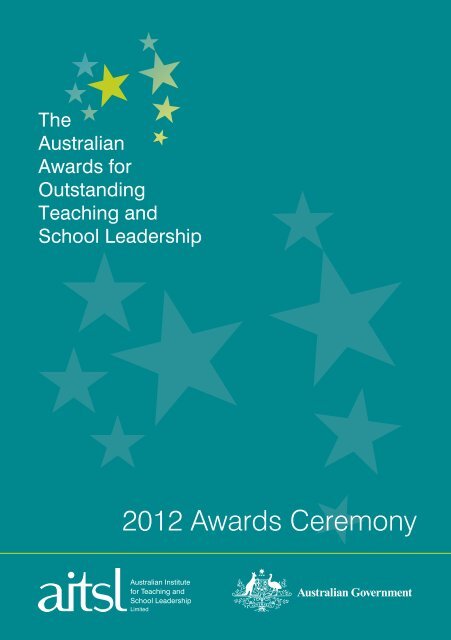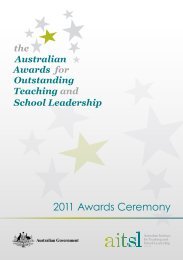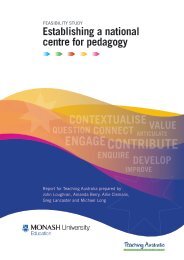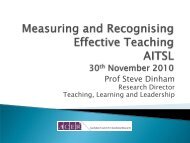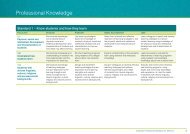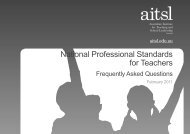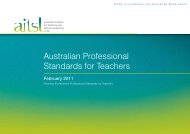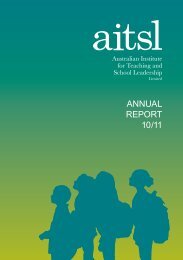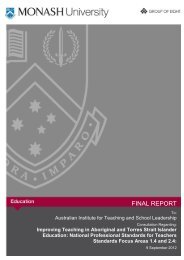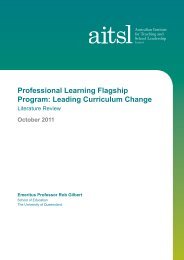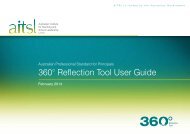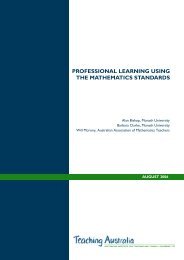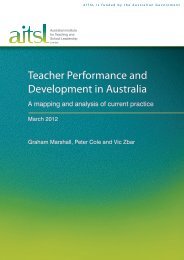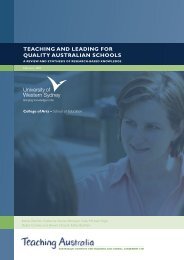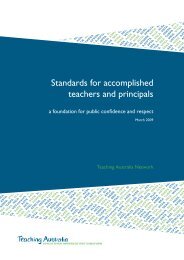2012 Awards Ceremony Booklet - Australian Institute for Teaching ...
2012 Awards Ceremony Booklet - Australian Institute for Teaching ...
2012 Awards Ceremony Booklet - Australian Institute for Teaching ...
Create successful ePaper yourself
Turn your PDF publications into a flip-book with our unique Google optimized e-Paper software.
The<strong>Australian</strong><strong>Awards</strong> <strong>for</strong>Outstanding<strong>Teaching</strong> andSchool Leadership<strong>2012</strong> <strong>Awards</strong> <strong>Ceremony</strong>
Message from the Minister <strong>for</strong> School Education,Early Childhood and YouthThe <strong>Australian</strong> <strong>Awards</strong> <strong>for</strong> Outstanding <strong>Teaching</strong> and School Leadershipare prestigious national awards supported by the <strong>Australian</strong> Government.The <strong>Awards</strong> present an opportunity <strong>for</strong> all teachers and school leaders to berecognised <strong>for</strong> their hard work and dedication in guiding and inspiring ouryoung people through their education. The <strong>Awards</strong> celebrate the importantcontribution that these professionals make to their students, schools andlocal communities.This year, my Minister’s Award <strong>for</strong> Excellence will again be awarded to a teacher or schoolleader who has shown outstanding innovation and initiative in Aboriginal and Torres StraitIslander Education.The finalists were nominated by government, Catholic and independent peak school educationbodies in each state and territory. They represent the teaching profession across a wide rangeof different educational settings. Each of the finalists are passionate educators with expertknowledge and experience in teaching, and are uniquely positioned to be able to inspire youngpeople and help them to realise their potential and find a rewarding pathway in life.I would like to congratulate the 48 teachers and school leaders selected as finalists. Yourdedication to changing the lives of young <strong>Australian</strong>s continues to inspire, and you have therespect and gratitude of your colleagues, students and communities.I would also like to thank the <strong>Australian</strong> <strong>Institute</strong> <strong>for</strong> <strong>Teaching</strong> and School Leadership, thejudging panels and school communities <strong>for</strong> making these national awards possible, andcongratulate them on their excellent and tireless work in continuing to raise the status of theteaching profession nationally.The quality of our teachers and school leaders is a major factor in improving educationaloutcomes <strong>for</strong> all students across the country. The <strong>Australian</strong> Government is committed torecognising the great work that our teachers and school leaders are doing every day, and theseawards are an important part of this ef<strong>for</strong>t. The Government is also determined to continuesupporting teachers and school leaders through our ef<strong>for</strong>ts to lift Australia’s school per<strong>for</strong>manceinto the top five countries globally by 2025 under the National Plan <strong>for</strong> School Improvement.Teachers and school leaders across Australia are a vital part of this ambitious plan.I wish the finalists all the best and would like to thank each of them <strong>for</strong> their hard work,dedication and commitment to educating Australia’s young people.The Hon Peter Garrett AM MPMinister <strong>for</strong> School Education, Early Childhood and Youth<strong>2012</strong> <strong>Awards</strong> <strong>Ceremony</strong>1
Message from the Chair of the Board<strong>Australian</strong> <strong>Institute</strong> <strong>for</strong> <strong>Teaching</strong> and School LeadershipThe <strong>Australian</strong> <strong>Awards</strong> <strong>for</strong> Outstanding <strong>Teaching</strong> and School Leadershipprovide an opportunity to recognise and celebrate the outstandingcontribution of the nation’s most talented teachers and school leaders.In <strong>2012</strong>, the <strong>Awards</strong> highlight 48 inspirational teachers and leaders insix award categories. Each approaches their work with great personalendeavour, professionalism and commitment. They work innovatively andtirelessly and have a significant impact on individual students, colleaguesand their professional communities. They exemplify the high quality professional knowledge,professional practice and professional engagement described in the National ProfessionalStandards <strong>for</strong> Teachers and National Professional Standard <strong>for</strong> Principals.The <strong>Australian</strong> <strong>Institute</strong> <strong>for</strong> <strong>Teaching</strong> and School Leadership welcomes its role in providingleadership in supporting the advancement of teacher quality in Australia, and its role inmanaging the <strong>Australian</strong> <strong>Awards</strong> <strong>for</strong> Outstanding <strong>Teaching</strong> and School Leadership. Byindentifying and drawing on the expertise of leading educators across Australia, and byinspiring excellence in others, the <strong>2012</strong> <strong>Awards</strong> will contribute to the building of a high qualityteaching profession.On behalf of the AITSL Board of Directors, I extend my congratulations to each of the <strong>2012</strong>finalists and winners and sincerely acknowledge all who work in schools across Australia, whoon a daily basis, make a difference to the lives of young <strong>Australian</strong>s.<strong>Awards</strong> <strong>Ceremony</strong>6 December <strong>2012</strong>WelcomeWelcome to CountryOpening addressState and Territory finalistpresentationsAnthony MackayChair, AITSL BoardMaster of CeremoniesAunty Josie AgiusKaurna ElderThe Hon Peter Garrett AM MPMinister <strong>for</strong> School Education,Early Childhood and Youth<strong>Australian</strong> Early Childhood Teacher of the Year<strong>Australian</strong> Primary Teacher of the Year<strong>Australian</strong> Secondary Teacher of the Year<strong>Australian</strong> Primary Principal of the Year<strong>Australian</strong> Secondary Principal of the Year<strong>Australian</strong> Government Minister’s Award <strong>for</strong>Excellence in <strong>Teaching</strong> or Leadership in Aboriginaland Torres Strait Islander EducationAnthony MackayChair of the Board<strong>Australian</strong> <strong>Institute</strong> <strong>for</strong> <strong>Teaching</strong> and School LeadershipNational Award presentationsStudent presentationIn each Award category as aboveTennessee CoulthardSchool Captain, Woodville High School, AdelaideCelebratory receptionString QuartetStudents from Concordia College, Adelaide2 <strong>2012</strong> <strong>Awards</strong> <strong>Ceremony</strong><strong>2012</strong> <strong>Awards</strong> <strong>Ceremony</strong>3
<strong>Australian</strong> Early Childhood Teacher of the Year<strong>Australian</strong> Capital Territory finalistGina NugentReid Preschool, Ainslie School, ReidChildren at Reid Preschool, a campus of Ainslie School in central Canberra, workin a creative and nurturing environment, thanks to Gina Nugent’s knowledge ofchild development and her understanding of how children learn.A talented and highly experienced early childhood teacher, Gina innovatively delivers the content ofthe curriculum through a developmental approach designed to meet each child’s physical, cognitive,language, social and emotional development. A visitor to her classroom will see confident andinvolved students working alone or together to create an imagined world, manipulating a range ofmaterials, creating artwork or conducting their own investigations. Gina runs a parent <strong>for</strong>um andregularly hosts social events to engage families.Gina is a strong team leader and contributor. She inspires others through her continual pursuit ofexcellence and new knowledge and readily contributes to the development of the early childhoodteaching profession. Examples of this include Gina’s participation in the National Quality Standardstrial and her strong contribution to the National Quality Framework’s Early Years Learning Frameworkduring its development. Gina’s all-round contribution saw her named the ACT’s Early ChildhoodEducator of the Year <strong>for</strong> <strong>2012</strong>.New South Wales finalistRebecca AndrewsJohn Brotchie Nursery School, BotanyJohn Brotchie Nursery School is acknowledged as an outstanding exampleof high standards — a status that reflects the vision, innovative thinking andinspirational leadership of teacher-in-charge Rebecca Andrews.Rebecca is passionate about play-based learning. She has a deep knowledge of the theoretical andpractical base of early years students and their learning styles, and provides rich and well-plannedlearning experiences. Reflective of this is the school’s stimulating indoor and outdoor environment,where students can interact and learn independently and in groups, supporting their social, physical,cognitive and emotional development. Rebecca’s commitment to continual improvement is evidentin the positive culture of reflective practice she has fostered. A mentor within her team, she led theintroduction of the Early Years Framework, National Quality Standards and the school’s QualityImprovement Plan, which has a strong focus on a whole-school approach to curriculum.Rebecca is a highly regarded role model and example to her teachers and parent community. This highesteem extends beyond the school. She often receives requests to present at conferences and regularlyhosts school-based visits so that others can benefit from her knowledge, experience and enthusiasm.Northern Territory finalistPenny WeilyBradshaw Primary School, Alice SpringsAs an early years senior teacher, Penny Weily has led significant change atBradshaw Primary School in central Alice Springs, where 50 per cent of thestudents are Indigenous.Penny has built a quality early-childhood team at Bradshaw, where she takes the lead in research,use of data, curriculum development and teaching practice to meet the learning needs of earlychildhood students, including Indigenous students and those with disability. She has introduced theGateway to Literacy program which has resulted in students developing improved oral skills and amore successful transference of learning across the curriculum.Penny has also led the introduction of national initiatives, including the National Quality Standardsand the <strong>Australian</strong> Curriculum. She has actively supported staff during these transitions and hascontributed to the Northern Territory’s Early Years Focus Group. Penny has completed the HighlyAccomplished and Lead Teacher programs as well as the Preparation <strong>for</strong> School LeadershipProgram. She is the Vice President of the Early Childhood Educators Association and deliversprofessional learning locally, at state and national level.Queensland finalistLinda VellaEimeo Road State School, Rural ViewIn addition to having a positive impact on her students, one of the many benefits thatflow from Linda Vella’s two decades of experience in early childhood education is thewealth of experience she is passing on to new generations of teachers.One of six preparatory teachers at Eimeo Road State School in Mackay, Linda draws on herknowledge of how young children learn to create a relevant, meaningful curriculum and stimulatinglearning environment. She has a strong commitment to the continued improvement in standardsof literacy and numeracy, demonstrated in her 2011 preparatory class’s continued rapid growth inreading levels after they transitioned to year one. Embedded in her classroom environment is Linda’srecognition of the vital role families play in their child’s learning and development.Linda was part of the team which from 2006 to 2008 helped to put in place the Early YearsCurriculum Guidelines in the Mackay and Whitsunday region. During this time Linda built strongnetworks with her colleagues in the early childhood sector and developed professional ties withCentral Queensland University’s Mackay campus, where she lectures and tutors in early childhoodstudies, and whose students she invites to her classes to gain practical experience. Linda mentorsmany existing colleagues and supports their professional development.4 <strong>2012</strong> <strong>Awards</strong> <strong>Ceremony</strong><strong>2012</strong> <strong>Awards</strong> <strong>Ceremony</strong> 5
South <strong>Australian</strong> finalistCasey BellKalaya Children’s Centre, QueenstownCasey Bell sees the engagement of caregivers and families as foundational to herwork as the preschool teacher at Kalaya Children’s Centre in Port Adelaide, wherearound 90 per cent of children are of Aboriginal or Torres Strait Islander descent.Casey gathers data from families and caregivers to set achievable learning goals <strong>for</strong> her studentsand to create culturally sensitive learning environments. She also develops curriculum whichaddresses their learning, wellbeing and developmental needs and which has personal significance<strong>for</strong> each child and their family. Her approach has resulted in improved student per<strong>for</strong>mance andeducational outcomes.Dedicated and highly professional, Casey’s impact extends across the school and professionalcommunity. She actively leads professional development at Kalaya <strong>for</strong> the national Educators’ Guideto Early Years Learning Framework, mentors early career teachers working in early childhood inAnangu Pitjantjatjara Yankunytjatjara Lands and has spoken at a range of educational conferences.Casey received the South <strong>Australian</strong> <strong>Teaching</strong> Award <strong>for</strong> Inspirational Preschool Teacher in 2011.Tasmanian finalistJade VecchioneJohn Paul II Catholic School, Clarendon ValeEnhancing children’s literacy and developing their skills in English is a specialinterest <strong>for</strong> Jade Vecchione, who taught at two other schools be<strong>for</strong>e beingappointed as Early Years Coordinator at John Paul II Catholic School inClarendon Vale, one of the lowest socio-economic areas in Tasmania.In each school the children in Jade’s care have exceeded the expectations held of them. Jademakes it a priority to know her students and the ways in which they learn so as to provideindividualised learning experiences. She creates a lively environment which combines directedlearning and play-based learning under supervision. To support her passion, Jade pioneered aresearch-based approach to literacy development at John Paul II. The success was twofold, bothlifting children’s early literacy skills and improving the capability of other teachers.Jade is a reflective practitioner. She confidently supports colleagues and introduces new ideasthrough visits to other centres and schools. She actively seeks strong working relationships with arange of health professionals and local community groups to better meet the needs of her students.Victorian finalistNaomi IversEltham East Primary School, ElthamDeveloping knowledge and understanding of how students learn is an essentialpart of Naomi Ivers’ teaching practice. The lead teacher and <strong>for</strong>mer Year 1classroom teacher is now in a role leading numeracy within the school and isusing her early-years experience to bring early-years practices into the upper years. She creates asafe and stimulating environment where students and their families are welcome, and provides acurriculum and learning programs in<strong>for</strong>med by data to meet the specific needs of each student.A dynamic leader within the school and her network, Naomi’s impact extends beyond the classroom.Within the collegial environment she has fostered, she has encouraged collaboration in herearly childhood team characteried by demonstration lessons, observation and feedback aimedat enhancing effective teaching strategies. Naomi has also mentored graduates and staff, ledprofessional learning teams, helped raise teacher capacity in the field of numeracy education andworked with the <strong>Australian</strong> Curriculum Assessment and Reporting Authority.Naomi was runner-up <strong>for</strong> the Outstanding Primary Teacher category in the 2010 Victorian EducationExcellence <strong>Awards</strong> and has recently completed the highly acclaimed Eleanor Davis SchoolLeadership Program.Western <strong>Australian</strong> finalistTonya WoodSawyers Valley Primary School, Sawyers ValleyAs the Kindergarten and Learning Support Coordinator at Sawyers Valley PrimarySchool, Tonya Wood is a highly competent and dedicated educator committedto improving student learning, particularly in the early years of education.Recognising that learning in the first five years sets the course <strong>for</strong> life, Tonya works closely withparents, carers and other education workers to understand and tailor learning to meet the needsof each and every student. She uses a play-based program supported by an explicit oral languageprogram and teaches more <strong>for</strong>mal concepts in preparation <strong>for</strong> later learning. She teaches the skillsof successful learning through a “You Can Do It” values program that provides developmentallyappropriate understanding using puppets, games and songs. Her dual role requires similar expertisein creating teaching and learning programs <strong>for</strong> students with specific needs.Tonya is an exemplary leader and highly effective change agent, modelling teaching strategies<strong>for</strong> her colleagues and providing active and sustainable support. Tonya’s individual achievementsinclude <strong>Australian</strong> Scholarships Group National Excellence in <strong>Teaching</strong> <strong>Awards</strong> in 2007 and 2008 andthe WA Premier’s Primary Teacher of the Year award in 2011.6 <strong>2012</strong> <strong>Awards</strong> <strong>Ceremony</strong><strong>2012</strong> <strong>Awards</strong> <strong>Ceremony</strong> 7
<strong>Australian</strong> Primary Teacher of the Year<strong>Australian</strong> Capital Territory finalistNina McCabeGarran Primary School, GarranIt is a measure of Nina McCabe’s achievement as an educational thinker andpractitioner that her ideas have influenced teaching and learning both at herschool and across the ACT.Nina’s deep understanding of students and how they learn, and her ability to plan and implementeffective learning, have lifted per<strong>for</strong>mance among all students at Garran Primary, where she is deputyprincipal. She actively supports building capacity across the school community, contributing tothe introduction of improved structures, developing new teaching and assessment strategies andleading thoughtful professional learning <strong>for</strong> her colleagues. An increasing number of schools acrossthe ACT are adopting strategies and resources developed under Nina’s leadership, such as criterionreferencedassessment of writing tools. She provides ongoing advice on implementing these toolsand on the professional learning required to support them.Nina has an ongoing commitment to her own and her colleagues’ professional learning with thegoal of improving outcomes <strong>for</strong> students. She is a leader of literacy education in Australia, a highlyskilled literacy and numeracy coach and a mentor <strong>for</strong> both novice and experienced educators bothat school and system level.New South Wales finalistSuzanne CrouchBuxton Public School, BuxtonSuzanne Crouch uses the knowledge acquired during her varied teaching careerto develop the skills of professional colleagues in many areas.Suzanne has taught all years from Kindergarten to Year 6, and held schoolleadership roles be<strong>for</strong>e being appointed as a Highly Accomplished Teacher at Buxton Public Schoolwhere she has led ef<strong>for</strong>ts to improve community engagement. Within the classroom Suzanneuses an array of teaching methods and creates challenging learning environments which stimulatestudents to strive to achieve their best. Her commitment to professional education includes a“masterclass” initiative which provides staff with an opportunity to observe how she developschildren’s learning abilities in literacy.She mentors early career teachers through her work, assisting them to develop through dynamicpractices such as peer coaching, critical friends and her work at the University of Wollongong.Suzanne has taught part–time (after a full school day) in the university’s education faculty <strong>for</strong> severalyears, assisting pre-service teachers to translate theory into practice. Her commitment to teachingresulted in an <strong>Australian</strong> College of Educators Award <strong>for</strong> Quality <strong>Teaching</strong> followed by an award <strong>for</strong>her “Contribution to the Training and Development of Pre-Service Teachers”.Northern Territory finalistKelly GreenBorroloola School, BorroloolaKelly Green’s quest <strong>for</strong> quality is reflected in her contributions to education in theNorthern Territory at school, regional and system level.In the classroom, Kelly is recognised as an exemplary teacher whosecommitment has positively impacted student outcomes and behaviour across Borroloola School,where some 97 per cent of the 300 students are Indigenous <strong>Australian</strong>s. She instills a sense ofpride and purpose in her students and her class is often the focus of collegiate visits. As curriculumand professional learning leader she has driven the implementation of curriculum and assessmentpractices and staff development at her school by continuously seeking fresh in<strong>for</strong>mation and takinginitiatives to turn the knowledge she has acquired into school-wide quality practice.Kelly is a dedicated mentor; guiding the development of assistant teachers, graduate and aspiringteacher-leaders in remote schools. Kelly has a history of involvement in curriculum, assessment andresource development projects <strong>for</strong> the department. Her achievements saw her selected in 2011 asone of 10 high-per<strong>for</strong>ming Remote <strong>Teaching</strong> Service teachers accepted into the Remote Teacher ofExcellence program.Queensland finalistKaye NorthSunbury State School, MaryboroughThroughout her career, which has taken her to Queensland schools fromTewantin to Thursday Island, Kaye North has taken on lead roles to enhancelearning outcomes <strong>for</strong> students and to promote networking between colleagues.At Sunbury State School, a diverse community where 25 per cent of pupils have learning difficulties,Kaye sets high expectations <strong>for</strong> each of her students in academic achievement and behaviour,and establishes structures and strategies to assist each to achieve their best. She supports thisby promoting lifelong learning skills to families. A particular passion is developing the skills – inherself and in her colleagues – to meet the needs of students as digital learners. Her knowledgein in<strong>for</strong>mation and communication technology has enriched the leadership she has been able todemonstrate in this area.Her expertise has made her an Accredited Facilitator <strong>for</strong> the Digital Pedagogy License and <strong>for</strong> theLearning Place, a position from which she can promote the use of technology to schools aroundMaryborough and the Fraser Coast.8 <strong>2012</strong> <strong>Awards</strong> <strong>Ceremony</strong><strong>2012</strong> <strong>Awards</strong> <strong>Ceremony</strong>9
South <strong>Australian</strong> finalistTamra Harvey-MardleGumeracha Primary School, GumerachaLife-long learning has become standard practice <strong>for</strong> Tamra Harvey-Mardle, whoeagerly shares the knowledge she has garnered from 21 years in the professionand continually explores new approaches to apply in her teaching and learning.An advanced skills junior primary teacher, Tamra is committed to maximising the learning outcomesof her students. She does this by setting high standards, catering <strong>for</strong> different learning styles andimplementing effective assessment strategies. She builds positive relationships with parents andencourages their involvement in student learning on a daily basis. Students seek her as their teacherand colleagues and parents recognise her contribution as an exemplary junior primary teacher.As an enthusiastic and highly skilled teacher leader, Tamra effectively challenges and improvesthe practice of her colleagues within the school and the district by building positive and respectfulrelationships and leading by example. Tamra has also held in<strong>for</strong>mal and <strong>for</strong>mal leadership roles,including deputy and teacher-in-charge, and has played an active role on the school’s personneladvisory committee, finance committee and governing council. Tamra’s strong record and continuinginfluence saw her named Inspirational Primary School Teacher of the Year in South Australia’s 2011Public <strong>Teaching</strong> <strong>Awards</strong>.Tasmanian finalistIngrid FieldingDodges Ferry Primary School, Dodges FerryAs assistant principal and teacher at Dodges Ferry Primary School, IngridFielding draws upon her <strong>for</strong>mal qualifications, extensive teaching experienceacross the primary continuum, and her understanding and respect <strong>for</strong> children tocreate opportunities <strong>for</strong> her students to succeed.Ingrid sets high standards <strong>for</strong> herself and <strong>for</strong> her students. She creates safe and supportive learningenvironments to stimulate engagement and enjoyment in learning in her students. Her welldevelopedability to determine what is required to address a deficit in skill or understanding in herstudents enables her to effectively challenge and guide them to the next level of their learning.Ingrid is committed to self-improvement and is a natural and supportive leader within the schoolcommunity. This is illustrated through her leadership of the introduction of the <strong>Australian</strong> Curriculumand her significant contribution to the development of programs such as Launching into Learningand Closing the Gap: an intensive literacy and numeracy program <strong>for</strong> Indigenous students. Throughthese programs, Ingrid has helped to develop a strong culture of community involvement to supportstudent outcomes at Dodges Ferry Primary School.Victorian finalistKathy GreenSt Francis Xavier Primary School, MontmorencyKathy Green’s approach to teaching and learning exemplifies the kind of widerengagement that St Francis Xavier Primary School in north-eastern Melbournestrives to offer — a challenging curriculum that connects students with theircommunity and the wider world.With a passion <strong>for</strong> the development and recognition of thinking and creativity in all curriculum areas,Kathy strives to create learning opportunities that extend and enrich her students. Consistent withthis, she challenges, guides and supports colleagues throughout the learning cycle to seek ways tobetter cater <strong>for</strong> the needs of their students. Kathy has provided school-based leadership in the areasof literacy, mathematics and student wellbeing.Kathy continually builds and actively shares her knowledge at school, zone and regional level. Shehas led professional learning that highlights the value of thinking and creativity in inquiry-basedlearning, in wellbeing, the arts and religious education, and has had an article on this topic publishedin the Catholic Education Office journal Learning Matters. Kathy presented a learning model that shehad developed with St Francis Xavier staff to the International Thinking Conference in Belfast in 2011and teaches literacy education at the <strong>Australian</strong> Catholic University’s Melbourne campus.Western <strong>Australian</strong> finalistWill Davis<strong>for</strong>merly at Tom Price Primary School, Tom PriceWill is an inspirational teacher and educational leader. Highly regarded andrespected by students, colleagues and parents alike, Will has made a significantimpact on the school community in both his role as classroom teacher and asassociate principal.Fair and approachable, the foundation of Will’s work is his ability to establish genuine and positiverelationships with students. Building on this, he uses his extensive subject and pedagogicalknowledge to support the learning needs of individual students. This includes explicit teaching,sophisticated curriculum differentiation and the strategic and purposeful use of technologies. Theimpact is illustrated in increases in positive student attitudes to and engagement with their learning,improved school attendance and gains in literacy and numeracy as measured by NAPLAN.Will is committed to professional learning <strong>for</strong> himself and his colleagues. A motivated andenthusiastic educator, Will sought to develop his expertise in First Steps Train the Trainer andongoing growth to maximise the impact of his teaching. He is also a supportive and generouscolleague, offering his time and expertise to support the professional growth of others within theschool and within his network.10 <strong>2012</strong> <strong>Awards</strong> <strong>Ceremony</strong><strong>2012</strong> <strong>Awards</strong> <strong>Ceremony</strong>11
<strong>Australian</strong> Secondary Teacher of the Year<strong>Australian</strong> Capital Territory finalistMartin Hine<strong>for</strong>merly at Calwell High School, CalwellBy focusing on quality teaching and learning, and aligning curriculum,assessment and reporting, Martin Hine aims to give each student the opportunityto reach their full potential.Martin draws on his comprehensive knowledge of adolescents and continually reviews, modifiesand expands his repertoire of teaching strategies to enable his students to develop their knowledgeand problem-solving, critical-thinking and creative-thinking skills. He also uses data to strengthenhis teacher practice and to in<strong>for</strong>m school-wide change. Martin’s positive impact extends beyondthe school community, including the Tuggeranong network. A highly regarded educational leader,he focuses much of his ef<strong>for</strong>ts on supporting new teachers and managing their professionaldevelopment. He has led the implementation of numerous initiatives and coaches and mentors hispeers to encourage professional observation and development at Calwell High School.His colleagues see him as a dynamic, <strong>for</strong>ward-thinking leader who has shown that he is not afraid to drivechange to ensure that the benefits of quality education reach every member of the school community.Martin is currently in a role in the ACT Education and Training Directorate.New South Wales finalistSandra WoodwardOakhill College, Castle HillA teacher of science and physics <strong>for</strong> over 14 years, Sandra constantly searches<strong>for</strong> ways to inspire student curiosity and enthusiasm <strong>for</strong> the sciences, and toimprove student learning outcomes.She draws on her expert curriculum and pedagogical knowledge and uses a variety ofmethodologies, in<strong>for</strong>mation communication technologies and authentic learning experiences toengage and encourage students to be active learners. She has developed science clubs at bothschools where she has taught, and initiated a Science Fair at Oakhill College during ScienceWeek. Academics and researchers have been brought in by Sandra on astronomy nights to deliverengaging lectures to the school community.Sandra is committed to supporting her colleagues to develop a passion <strong>for</strong> science through thedevelopment of classroom resources and programs and through mentoring. The success of heref<strong>for</strong>ts is evident in the fact that the Science Club now involves all staff from the Science faculty plusteachers, administration staff and 90 students. Beyond the school, Sandra is co-authoring the In2Physics textbook and its accompanying resource manual. She has written physics trial examinationpapers <strong>for</strong> the Higher School Certificate and delivered workshops at Sydney University.Northern Territory finalistKristina Tulen-PattisonNgukurr Community Education Centre, KatherineSince Kristina Tulen-Pattison arrived two years ago at Ngukurr CommunityEducation Centre, 320 kilometres south east of Katherine, she has trans<strong>for</strong>medsenior secondary programs <strong>for</strong> its wholly Indigenous student population.With a strong history of positive impact on adolescents in challenging secondary school contexts,Kristina has developed in-school, and out-of-school activities, structures and processes which areflexible and have a strong focus on literacy and numeracy. This approach has been built on anunderstanding of factors impacting on each student and their future aspirations, gained throughthe development of strong relationships and trust with students and families. The impact has beenconsiderable. School attendance and engagement has increased, with enrolments of Year 7-12students increasing from 58 to 80 within a year. In 2011 six Ngukurr students successfully completedYear 11 subjects — something no student had done previously – and in <strong>2012</strong> that number is set todouble. Parents now see Ngukurr as offering comparable secondary school programs to boardingschools in town.Not only is Kristina dedicated to providing the best possible opportunities <strong>for</strong> her students, shegenerously mentors and supports new and experienced colleagues.Queensland finalistWill CurthoysOakey State High School, OakeyThrough the example he sets and his strong leadership, Will Curthoys has ledthe development of a culture characterised by positive behaviour and increasedstudent engagement and outcomes at Oakey State High School.Will displays exemplary skills when relating to students, especially with those who fail to thrivein a traditional classroom setting. He draws on counselling, relational and partnership skills andtaps into community passions such as sport to develop positive relationships and get studentsreally engaged. He has extended this impact through his management of the School WidePositive Behaviour Support program. The success of his approach is evident in data which reflectsreductions in school disciplinary absences and referrals <strong>for</strong> poor classroom behaviour. In addition,student attendance and staff morale have notably increased.Will has led school-wide re<strong>for</strong>ms in Indigenous education which have included strengtheningpartnerships between the school and the Indigenous community and encouraging Indigenousstudents to take part in industry and university-run mentorship programs, resulting in greateracademic success and opportunities. With a drive and ability to motivate others, a positive attitudeand high expectations, Will provides professional development and leads the Positive <strong>Teaching</strong> andLearning agenda with the Oakey State High School staff.12 <strong>2012</strong> <strong>Awards</strong> <strong>Ceremony</strong><strong>2012</strong> <strong>Awards</strong> <strong>Ceremony</strong>13
South <strong>Australian</strong> finalistKirsty GebertNuriootpa High School, NuriootpaIf proof were needed of the often-heard claim that good teachers make adifference, it would be found in Kirsty Gebert’s successes at Nuriootpa HighSchool, a co-ed school in the Barossa Valley.Kirsty’s specialist area is psychology and she is an expert on how students learn. Her studentsconsistently per<strong>for</strong>m well above the South <strong>Australian</strong> average, with her Year 12 students havingattained 12 merit scores (perfect 20/20) in the past 5 years over a range of three different subjects.Kirsty is committed to supporting every student to reach their full potential and has responsibility <strong>for</strong>ensuring at-risk students are managed individually and have alternative programs and pathwaysoutside the school.Beyond the classroom, Kirsty is an inspirational coach and mentor to other staff. She constantlystrives to improve her knowledge through research, readily sharing professional readings with hercolleagues and engaging in discussions around improving outcomes <strong>for</strong> students. As the school’scoordinator <strong>for</strong> two subjects within the SA Certificate of Education, Kirsty leads the curriculum andprofessional development <strong>for</strong> her team. She has actively engaged with the profession by convening astate conference, contributing to a textbook, and having her resources published as exemplars on theSA Certificate of Education website.Tasmanian finalistKerry WhelanSorell School, SorellVictorian finalistDaniel ButtacavoliEmmanuel College, Altona NorthDaniel Buttacavoli’s practice is driven by a passion <strong>for</strong> the craft of teaching anda commitment to nurturing and challenging each of his students to be the bestthey can be. “I see education as a gateway to a bigger world,” he says.As a VCE English teacher and leader of the English faculty at Emmanuel College, Daniel establishespositive and genuine relationships with his students, draws upon a deep knowledge of his subjectand practice and tailors tasks and feedback to meet the needs of students. The result of this hasbeen consistently improved student results and greater student and parental confidence. Danielalso actively seeks and supports extracurricular activities to challenge his students and broadenopportunities <strong>for</strong> them to develop as well-rounded citizens. He leads his colleagues in the rigorousapplication of student data to improve literacy outcomes across all year levels.Highly regarded by his peers, Daniel is committed to helping to build a quality teaching profession.His collegiality has enriched the school’s professional learning culture. He is a contributor to thePearson English Teacher Companion and a participant in a joint Victorian <strong>Institute</strong> of <strong>Teaching</strong>-CECVpilot on recognising high-per<strong>for</strong>ming teachers.Western <strong>Australian</strong> finalistEsther Wilkes HillPerth Modern School, SubiacoA highly experienced teacher, Kerry Whelan has had a positive impact onthe engagement and outcomes of students at Sorell School through hercommitment to building quality relationships and providing relevant curriculumthat engages and motivates students.of gifted students.As an inspirational classroom teacher and educational leader, Esther WilkesHill’s professional endeavours inside and outside her school are prompted by acommitment to understanding and meeting the learning and development needsOne of the initiatives Kerry has developed and implemented is a highly successful retention program<strong>for</strong> Year 10 students. The program has been used to showcase the inter-relationships betweenschools, families and the broader community. Kerry has built a trans<strong>for</strong>mative culture based ona Leading Teams model where students establish a “trademark” <strong>for</strong> the sub-school and developassociated trademark behaviours. As transitions leader, Kerry is also responsible <strong>for</strong> the welfare of allYear 10s at the school and in this capacity she has built up extensive, effective working relationshipswith families, community groups, employers and supporting agencies to influence positive learningoutcomes <strong>for</strong> her students. She values and actively engages in school extracurricular activities.Kerry is committed to her own professional learning and through her leadership and mentorship,willingly shares her experience and expertise. In doing so, she has contributed to building a schoolcommunity where students and teachers work collaboratively <strong>for</strong> the benefit of all.Esther is English teacher and learning coordinator at Perth Modern School, Western Australia’sonly fully selective school <strong>for</strong> gifted and talented students. Always exploring new and creative waysto challenge and engage her students, Esther develops and delivers enriched and differentiatedcurriculum using a range of teaching techniques. She is motivated and inspired by bringing teachersand students together, and has organised overseas and interstate experts to give professionallearning presentations to students and teachers.Esther shares openly and broadly, willingly mentoring and supporting new and experienced teachers.The interdisciplinary Thinking Group she established with colleagues in 2008 is helping to buildschool cultures that have innovation, collaboration and learner empowerment at their core. Esther’sexpertise in teaching English and literature was recognised in 2011 when she was named the WAPremier’s Secondary Teacher of the Year.14 <strong>2012</strong> <strong>Awards</strong> <strong>Ceremony</strong><strong>2012</strong> <strong>Awards</strong> <strong>Ceremony</strong>15
<strong>Australian</strong> Primary Principal of the Year<strong>Australian</strong> Capital Territory finalistKarin WetselaarCranleigh School, HoltKarin Wetselaar’s determination to create opportunities <strong>for</strong> her students, heropenness to new ideas, and her ability to <strong>for</strong>ge partnerships with colleaguesand parents have created a vibrant and stimulating community at CranleighSchool, which caters <strong>for</strong> children up to 12 years of age who have developmental delays, autism andintellectual or multiple disabilities.With a clear vision and the high expectations she has set, underpinned by quality teaching, the schoolhas seen students’ results improve markedly. Karin has initiated the Cranleigh Augmentative andAlternative Communication Framework, a pioneering approach to teaching communication skillswhich has made it easier <strong>for</strong> students to work and play together and to exercise more control over theirenvironment. She has established collaborative integration programs with other ACT schools, givingstudents opportunities <strong>for</strong> inclusion and promoting the school to the wider community.As one who is herself eager to learn, Karin values her colleagues’ professional development and hasput a coaching and mentoring process in place to extend their skills and knowledge. That, combinedwith the strong bonds developed with parents and the community, helps Cranleigh to live up to itsmotto, ‘Achieving potential together’.New South Wales finalistDeborah HannonThe Entrance Public School, The EntranceDeborah Hannon has been the dynamic principal of The Entrance PublicSchool, in a predominantly low-socio-economic area, since 2007. Her leadershiphas trans<strong>for</strong>med the school and engendered a vision of high standards andexpectations among students, staff and families.Deborah’s relentless focus on high expectations, explicit and systematic delivery of provennumeracy and literacy programs, ongoing targeted professional learning and building of positiverelationships within the school community have led to highly improved student outcomes. Othersignificant achievements include an increase in enrolments by 120 over the past three years and theintroduction of an aspirations program with an emphasis on career education..Deborah mentors and develops her staff, ensuring they feel part of a network of professionals.She takes a lead in the local professional community, where <strong>for</strong> the past three years she has beenpresident of the HCC Regional Principals’ conference committee and executive member of theCentral Coast Primary Principals’ Association. Deborah has also re-energised family and communityengagement with the school — underlining her insistence that “a solid partnership between homeand school” is essential to success.Northern Territory finalistDavid GlydeGillen Primary School, Alice SpringsDavid Glyde is a highly effective school leader who has created a culture of highexpectations built on positive relationships and trust at Gillen Primary School.Located in Alice Springs, the school has around 320 enrolments of childrenfrom varied cultural backgrounds. About 70 per cent are Indigenous students who move frequentlybetween bush communities and urban centres.David has initiated a comprehensive improvement program to lift literacy, numeracy and attendance,and to build community engagement, using targeted resources and developing staff capability. One ofDavid’s major achievements has been the implementation of Accelerated Literacy at the school, a projectthat has led to Gillen Primary becoming the Hub School <strong>for</strong> Accelerated Literacy in Central Australia.David has worked intensively to create and maintain the strong community relationships thatcontribute to better learning. As a manager, coach and mentor, David has driven the professionallearning and skills acquisition that have equipped his staff to reach high standards in quality teaching.Queensland finalistMargaret GurneyGoodna State School, GoodnaGoodna State School, a rich multicultural community in a low socio-economicarea, has become a “school of choice” thanks to Margaret Gurney’s belief and ashared vision that every child can learn and achieve.Margaret leads a school community with a clear focus on explicit and differentiated teaching andlearning. She has introduced a team structure which sees the development, implementation andmonitoring of strategies that support staff and each and every child to set goals and strive <strong>for</strong>excellence. Examples of these initiatives include the Goodna Headstart Kindergarten program set upin collaboration with regional early childhood staff, and an Oral Language Program established <strong>for</strong>children from Kindy to Year 3, with the support of speech therapists and a trained aide. Enrolmentshave risen by a third, and student outcomes across all year levels and key learning areas haveimproved consistently over the past four years.By responding to identified needs and actively promoting high expectations of all members of theschool community, Margaret has changed the culture of the school and shown all students that theycan succeed. Margaret led her team to win the 2011 Education Queensland Showcase Award <strong>for</strong>Excellence in Leadership <strong>for</strong> her collective capacity-building model, and is an active member of theQueensland Association of State School Principals.16 <strong>2012</strong> <strong>Awards</strong> <strong>Ceremony</strong><strong>2012</strong> <strong>Awards</strong> <strong>Ceremony</strong>17
South <strong>Australian</strong> finalistBrenton Willson<strong>for</strong>merly at Gladstone Primary School, GladstoneAn enthusiastic and dedicated school leader, Brenton Willson believes that allstaff and students have the capacity to learn – and to learn together.With this foundation, when appointed principal at Gladstone Primary School in2007, Brenton led a whole-school commitment and approach to improving student achievement.A specific focus was on improved teaching and learning in spelling. Baseline data was gathered,students set goals and staff developed effective pedagogies through collaborative professionallearning. The impact in the first 10 months was marked, with 96 per cent of students improving theirspelling. Brenton also implemented Individual Learning Plans <strong>for</strong> all staff and students. Student plansare characterised by learning-specific goals — community goals which focus on learning outside ofthe school, and on wellbeing and ICT. Staff goals are aligned to the Site Improvement Plan and thelearning priorities of the individual staff member.The positive impact of this cultural shift has been underpinned by Brenton’s skillful strategicplanning and consultation with all members of the school community. In 2011, Brenton won theSouth <strong>Australian</strong> Inspirational School Leader of the Year Award. He is currently seconded to the SADepartment <strong>for</strong> Education and Child Development where he is supporting the implementation of the<strong>Australian</strong> Curriculum in the state.Tasmanian finalistJane BovillRiverside Primary School, RiversideJane is a passionate, hard-working and innovative educator with anexceptional capacity to transfer theory into practice in order to improveoutcomes <strong>for</strong> her students.She has had leadership roles in a range of contexts during more than 30 years in the Departmentof Education. As principal of her <strong>for</strong>mer school, St Leonards Primary in regional Tasmania, she leddramatic school improvement in learning outcomes in literacy and numeracy that have taken theschool from a state-funded support initiative, Raising the Bar, to NAPLAN results that are consistentlyabove similar schools and above the national average in most measures.Jane’s capacity to support school improvement is enhanced by her exemplary strategic and innovativethinking and an ability to develop productive relationships across the school and broader community.Through her leadership, Jane positively contributes to building the capacity of her professionalcommunity. Examples include putting in place teacher training school-based partnerships with theUniversity of Tasmania and being the Lead School in Literacy and Numeracy in the network. She iscurrently principal of Riverside Primary School, the largest primary school in Tasmania.Victorian finalistLoretta HamiltonCourtenay Gardens Primary School, Cranbourne NorthIt is a measure of Loretta Hamilton’s professional influence that 27 of theteachers who have worked where she has been principal have gone on tobecome principals, with an additional three as deputy principals.It is 18 years since Loretta became the inaugural principal at Courtenay Gardens Primary Schoolin Cranbourne, and in the intervening years she has fostered a culture of high expectations andcommitment to excellence among teachers and the school’s 700 students, many of whom arefrom challenging socio-economic backgrounds. Her ability to draw on her extensive professionalexperience has helped to create a lively school culture in which students feel they are supported andchallenged. Using a distributive and collaborative leadership model which emphasises innovation,Loretta has led the implementation of a strong whole-of-school approach to literacy and numeracy,science and multi-media and makes contact with families a priority. The school won the VictorianEducation Excellence <strong>Awards</strong> in 2009 <strong>for</strong> Curriculum Innovation and is a case study with the OECD.Loretta and her staff have provided professional learning to over 2,000 educators in four years. Sheconducts weekly learning sessions facilitated by staff, contributes to departmental initiatives andcreates multiple opportunities <strong>for</strong> staff to explore world’s best practice.Western <strong>Australian</strong> finalistElisabeth TurnerWaggrakine Primary School, WaggrakineLis Turner brought extensive experience in curriculum development and priorteaching experience at primary, secondary and tertiary levels when appointedprincipal at Waggrakine Primary School in 2008.Located 400km north of Perth, Waggrakine Primary School is acknowledged as a leading school indeveloping 21st-century learning and has a very strong international outlook. As well as collaborativelinks to schools in Indonesia, Korea, Sri Lanka and Malaysia, it is now one of two <strong>Australian</strong> schoolsselected as a 2013 Microsoft Mentor School, chosen <strong>for</strong> their trans<strong>for</strong>mative use of technologyin teaching and learning and <strong>for</strong> successfully implementing change. Lis’ leadership and effectivechange-management strategies, based on thorough research, sound data and clear methodology,have contributed to this success. Staff are encouraged “to have a go, take risks, try new ideas andlead in different areas of expertise”.Lis is also Network Principal of schools within the Geraldton area and leads the Geraldton literacystrategy. She was WA’s Primary Principal of the Year in 2011, and was recently awarded an <strong>Australian</strong>Council <strong>for</strong> Educational Leaders Fellowship and a Churchill Fellowship in <strong>2012</strong>.18 <strong>2012</strong> <strong>Awards</strong> <strong>Ceremony</strong><strong>2012</strong> <strong>Awards</strong> <strong>Ceremony</strong>19
<strong>Australian</strong> Secondary Principal of the Year<strong>Australian</strong> Capital Territory finalistColleen MathesonLyneham High School, LynehamColleen Matheson is an outstanding educational leader with a powerfulcommitment to giving every student the chance to enjoy the best educationpossible and, in doing so, open opportunities <strong>for</strong> a successful future.Colleen became principal at Lyneham High in 2007 and has made it her priority to support thedevelopment of a strong professional culture within the staff to better meet the needs of students.An example of this is the development and implementation of instructional rounds based on theQuality <strong>Teaching</strong> model. The three-year project has involved building staff knowledge of the QTmframework, modelling classroom observations and providing feedback. The result has been a strongcollaborative culture focused on a cycle of continuous improvement in classroom teaching.Colleen is an active leader beyond the school. She led the North Canberra community in establishinga Reconciliation Action Plan <strong>for</strong> Lyneham High School and worked with Aboriginal leaders indeveloping it. Among her colleagues in the ACT school system, Colleen is seen as “the principals’principal”, a status that reflects the great esteem in which she is held <strong>for</strong> the support she gives toteachers and fellow principals. She has a personal commitment to lifelong learning and nurturespotential and future leaders through coaching, mentoring and succession planning.New South Wales finalistShayne PlayerTuggerah Lakes Secondary College, Tumbi Umbi CampusThe principal of Tuggerah Lakes Secondary College’s Tumbi Umbi Campus,Shayne Player is universally respected and unreservedly committed to making adifference within her school, her community and the teaching profession.Through Shayne Player’s leadership, TLSC Tumbi Umbi Campus has been “turned around” andbecome a learning community that provides each student with the opportunity to reach their fullpotential. With a strong focus on inclusivity, a range of programs and opportunities are offered tosupport individual students’ academic, cultural, social and emotional development. Action anddecisions are based on finding the answer to the question – “How is this child smart?” One exampleis the Advancement Via Individual Determination program designed to give support to students in themiddle years so that they are equipped to achieve their best in their final years of schooling, aspiringto further education and training. Staff, students and parents have commented on the positive impactof the program on student confidence and success.Shayne leads by example, with confidence, humility and expertise. New and experienced teachersare inspired to excel and empowered to accept new challenges. Shayne has encouraged andinvigorated experienced teachers to continue in the profession and readily celebrates achievements.Her impact beyond the school is considerable, taking a leadership role in the Tuggerah LakesLearning Community and other network groups.Northern Territory finalistBryan HughesShepherdson College, WinnellieBryan Hughes, College Director at Shepherdson College, has fostered a wholeschoolfocus on high expectations around teaching and learning so as to meet thediverse needs of the Indigenous and non-Indigenous communities at his school.Bryan has drawn on his experience in primary, secondary and special schools as leader ofShepherdson College, known previously as an Indigenous Community Education Centre atGaliwin’ku on Elcho Island, which provides schooling <strong>for</strong> some 530 students and brings educationalservices to four Homeland Learning Centres. His comprehensive programs run from Families asFirst Teachers (children aged 0-3), through pre-school to senior secondary school. Adult Educationprograms include vocational education and training and the opportunity to complete the Certificateof Education and Training at Year 12. The college curriculum is characterised by the strong Yolngucultural and language heritage of the Indigenous communities it serves.As a result of Bryan’s vision and leadership, staff have had opportunities to learn local languages andmany Indigenous staff, local artists and musicians have been employed as role models <strong>for</strong> the schoolcommunity. Bryan is an innovative leader, and willingly shares effective practice at in<strong>for</strong>mal and <strong>for</strong>malmeetings, conferences and mentoring sessions to benefit education across the Northern Territory.Queensland finalistDon McDermidProserpine State High School, Proserpine (nominated while atGlenden State School)The principal at Proserpine State High School, Don McDermid, has a strongcommitment to a whole-of-school approach to high-quality teaching and learning.As an educational leader, Don trans<strong>for</strong>med the curriculum direction and teaching approach atGlenden State School Prep - Year 12 campus, demonstrating his ability to implement systemicrequirements, while embracing the uniqueness and strengths of the school community. Hesupported this by empowering staff to continually engage in professional development, respondingto in<strong>for</strong>mal and <strong>for</strong>mal feedback from students, staff and parents, and by drawing upon productivecommunity networks and partnerships. One example of this is while at Glenden State School heworked with the local mining sector to develop industry-specific courses that students find relevantand engaging. The outcome was improved student outcomes and increased community confidencein public education.Don’s exemplary work and leadership has been recognised with a number of Showcase awards, andby Glenden State School being chosen as one of 20 pilot schools <strong>for</strong> the Year 7 and High SchoolFlying Start Program in Queensland.20 <strong>2012</strong> <strong>Awards</strong> <strong>Ceremony</strong><strong>2012</strong> <strong>Awards</strong> <strong>Ceremony</strong>21
South <strong>Australian</strong> finalistKim HebenstreitThebarton Senior College, TorrensvilleThrough the leadership of Kim Hebenstreit, principal of Thebarton SeniorCollege, enrolments have increased from 550 to 1020, attendance rates haveimproved by 11 per cent and students are achieving better results in the SACertificate of Education.The majority of students at Thebarton Senior College are refugees from non-English speakingbackgrounds whose capacity to learn may be hampered by personal trauma, poor English andsometimes poor literacy. To meet the unique needs of the community, Kim led a review of thecurriculum to give appropriate access to academic, vocational and community-based courses.He supported staff with a comprehensive professional learning program, including mentoring andcoaching to enable the school to be a highly effective learning community. Several teachers arenow seen as state leaders in the teaching of English to migrants, in student well-being, literacydevelopment and vocational education.Reflective of Kim’s innovative leadership and strong community partnerships, he has developedthe school into a Community Hub with medical, financial and counselling services to support thediverse student population. In 2007, collaboration with the Save the Children Fund led to Thebartonbecoming the first <strong>Australian</strong> secondary school to fly the United Nations flag and be recognised as aUN School <strong>for</strong> Global Peace.Tasmanian finalistLarissa BrennerTasman District School, NubeenaAs principal of Tasman District School, Larissa Brenner has demonstrated thatthrough strong leadership and a shared purpose a school can be trans<strong>for</strong>medinto a highly dynamic, innovative and learning-focused community.Drawing upon her deep knowledge and understanding of education, effective management ofresources and exemplary interpersonal skills, Larissa has inspired and motivated students, staff andmembers of her community. The outcomes have been significant: academic results have improvedmarkedly school-wide, retention rates from Year 10 to the college years have increased, digitaltechnology is now a seamless part of the learning environment and the National Curriculum is beingimplemented with rigour and relevance inspired by and connected with the rich resources of theTasman Peninsula. Benefits from “wrap-around” services through the development of a CommunityHub are also apparent. Tasman DHS is a lead literacy/numeracy school within its 19-school networkand is recognised as a centre of excellence in school-wide positive behaviour support.Highly professional and motivated, Larissa recognises the significance of her role at the local,regional, national and global level and exemplifies the qualities and practices required of 21stcenturyeducation leaders.Victorian finalistPeter WhiteNotre Dame College, SheppartonUnderpinned by a strong belief that all students, irrespective of ability,have the right to the best education possible, Peter White has trans<strong>for</strong>medNotre Dame College.Peter has led the development of a range of innovative, inspiring programs that respond to theethnically and economically diverse students and families of the Goulburn Valley where the collegeis located. He keeps abreast of contemporary educational theory and practice, uses his financialskills and insight to optimise facilities and has the courage to innovate and test new ideas. Anexample which combines many of these attributes is the McAuley Champagnat Programme whichhe developed and launched in 2006 to help disadvantaged students who were disengaged. Thecommunity-oriented program aims to draw 12 to 18-year-olds back into mainstream education,see them enrol in TAFE, take up an apprenticeship or enter other employment. Small class sizes,intensive personal assistance and a focus on literacy, numeracy, life skills and self-esteem areessential elements of a program that has won national recognition.Peter is committed to his own professional learning and actively supports and mentors staff tosupport the accomplishment of the college’s vision.Western <strong>Australian</strong> finalistSteffan SilcoxBallajura Community College, BallajuraSteffan Silcox’s ability to inspire, motivate and empower others to strive <strong>for</strong>excellence in personal development and educational achievement is a hallmarkof his leadership.Through Steffan’s strong leadership and expert professional knowledge, Ballajura CommunityCollege, which comprises more than 1900 students from 65 ethnic, language and cultural groups,has become a highly regarded educational institution with a reputation <strong>for</strong> academic excellence andrigour. To achieve this, he has created a strong leadership team, initiated significant improvements infacilities to support student learning and readily supports the professional growth of his staff througha comprehensive per<strong>for</strong>mance management process incorporating professional development. Theimpact is illustrated by the college’s achievement of 100 per cent secondary graduation over thepast seven years and enhanced student engagement.Steffan has fostered positive relationships with all members of the school and broader Ballajuracommunity to better meet the needs of his students. He has contributed to the WA teachingcommunity, including through the support and guidance of schools preparing submissions <strong>for</strong>Independent Public School status. His all-round achievements saw him named WA SecondaryPrincipal of the Year in 2011.22 <strong>2012</strong> <strong>Awards</strong> <strong>Ceremony</strong><strong>2012</strong> <strong>Awards</strong> <strong>Ceremony</strong>23
The <strong>Australian</strong> Government Minister’s Award <strong>for</strong> Excellence in <strong>Teaching</strong>or Leadership in Aboriginal and Torres Strait Islander Education<strong>Australian</strong> Capital Territory finalistRobert (Bob) PastorJervis Bay School, Jervis Bay TerritoryThrough Bob Pastor’s leadership, extensive experience and whole-of-schoolapproach to teaching and learning, the Jervis Bay School community hasexperienced improved student engagement, achievement and attendance.As the principal at the school, Bob has led considerable change. He has introduced a strong focuson literacy and numeracy which has seen student achievement in spelling in Years 3 – 5 increaseto 28.2 per cent above the ACT average; and other literacy standards extended beyond the stateaverage. He has developed a professional learning community characterised by staff who feeltheir practice is supported and encouraged to innovate to better meet the needs of their students.He has built resources where needed and emphasised the need to reconnect the school withlocal Indigenous communities. He negotiated to put a local language program in place and hasincorporated the area’s Indigenous history and culture into the school’s teaching so that studentshave a sense of the place where they live.Beyond the school community, Bob’s energy and commitment is also evident. He is a key andfounding member of the Learning 4 Life Partnership, which is an umbrella organisation vested withenabling communication and coordination of initiatives within the Jervis Bay Territory to meet theneeds of Indigenous students.New South Wales finalistKaren DoyleWestdale Public School, TamworthKaren Doyle has led the creation of a harmonious and high-achievingenvironment <strong>for</strong> Westdale Public School’s 460 students, a quarter of whomare Aboriginal. Westdale Public was one of the first schools in NSW to fly theAboriginal flag, acknowledgement of the generations of Aboriginal families who have passed throughthe campus since it was established a century ago on the western edge of Tamworth.As principal, Karen’s visionary plan was to move the school <strong>for</strong>ward with a particular focus on ICT,engagement of Aboriginal students and families, implementation of the Aboriginal Education Policyand targeted professional learning <strong>for</strong> staff. Through her vision and related policies and structures,she implemented and sustained an array of programs <strong>for</strong> Aboriginal students which have resulted insignificant improvements in literacy and numeracy in particular, as well as other achievements in the arts,sport, wellbeing and school partnership. She has developed inventive approaches to using data toassess progress and shape developments, approaches that are recognised across the state as animportant contribution to handling in<strong>for</strong>mation.Already a recipient of numerous awards, Westdale Public has earned Regional Giyanha Dirrabuu Murriawards as an outstanding school and <strong>for</strong> an outstanding contribution by an Aboriginal staff member.Northern Territory finalistEsther (Billi) DjayhgurrngaGunbalanya School, GunbalanyaA highly respected Indigenous community leader with a passion <strong>for</strong> education,and one of only two Indigenous principals in the Northern Territory, BilliDjayhgurrnga has led significant re<strong>for</strong>m as the principal at Gunbalanya School inthe West Arnhem College.Billi’s leadership is marked by a commitment to student engagement in learning, innovation andpositive relationships. An example of this is Billi’s collaboration with the school council to advocate<strong>for</strong> a flexible school year at Gunbalanya that is aligned with the seasons. As a result, this yearGunbalanya’s school year began in early January, when children were in the community during theWet, and the long break shifted to midyear, when customarily children are away with their families.The positive results are already apparent, with significantly improved attendance among the 350students. Staff satisfaction and morale remains high at Gunbalanya school.Billi has worked with families and the community to develop a shared understanding of whyeducation matters and uses “Cultures of Collaboration” as the basis <strong>for</strong> her engagement. Throughthis approach, local people have come to regard the school as part of the community.Queensland finalistMichael HansenCairns West State School, ManundaMichael Hansen’s strong leadership and high expectations at Cairns West StateSchool have helped to trans<strong>for</strong>m student engagement; closing the gap betweenIndigenous and non-Indigenous academic achievement and bringing greaterfamily involvement within the school community.Much of this success springs from the Academic Success Guarantee that Michael introduced in2009; a pact in which parents commit to sending their children to school 95 per cent of the time andthe school guarantees, in return, that these students will meet or exceed their year-level benchmarks.More than half of the families at the school have signed up and student per<strong>for</strong>mance has improved somarkedly that last year Cairns West won the Queensland Showcase Award <strong>for</strong> Academic Excellence.Another innovative solution Michael has implemented in response to a challenge is his adaptationof the assessment and reporting cycle at Cairns West to better fit with the movement of families thatcome to Cairns temporarily from the Torres Strait.Michael establishes structures to enable individual expertise to benefit all. Parents are now muchmore engaged in school activities and there is an active P&C committee, while outside the schoollocal business owners speak positively about the students’ improved behaviour and sense of pride.24 <strong>2012</strong> <strong>Awards</strong> <strong>Ceremony</strong><strong>2012</strong> <strong>Awards</strong> <strong>Ceremony</strong>25
South <strong>Australian</strong> finalistChristine BellMimili Anangu School, MimiliSince becoming principal at Mimili Anangu School in 2007, Christine Bell haspursued a program of continuous school improvement to meet the needs of100 Indigenous students from birth to Year 12 — all of whom have Pitjantjatjara /Yankunytjatjara as their first language — and those of staff, families and the community.Christine has led the development of a shared vision of excellence embraced by the whole community.Through her learning-centred leadership style there is a clear focus on improving learning outcomes,particularly in literacy and numeracy. This is supported through the development of student literacyprofiles, working with the literacy coordinator, and targeted provision of regular, and relevant staffprofessional development focused on building partnerships with community leaders, parentsand families to support the literacy of their students. Evidence of the success is seen in the 55per cent increase in families reading or listening to their children read and improvements in postreadingachievement by 15 per cent across the primary years. Increased student engagement,increased retention and improved academic achievement in the senior year levels are outcomes of aredevelopment of the program <strong>for</strong> senior students – another initiative led by Christine.Christine has supported staff through structured and purposeful professional development plansand staff are encouraged to engage with the wider profession and share their practices outside theschool. She is a valued mentor and role model.Tasmanian finalistTrent GrahamReece High School, Devonport (nominated while at Penguin High School)Throughout his 10 years in the profession, Trent Graham has demonstrated hisskill at teaching across all age groups, in a broad range of curriculum areas andin meeting the specific needs of Aboriginal students.Trent encourages his students to be proud of themselves and their heritage. When at PenguinHigh School, he initiated a quality Aboriginal education program grounded in respect <strong>for</strong> Aboriginalcultures and diversity, and characterised by high expectations, Aboriginal curriculum and pedagogyand effective home and school partnerships.Highly regarded by students, colleagues and families, Trent creates a supportive learningenvironment and draws on a diverse range of teaching strategies, inside and outside the classroom,aimed to both optimise student understanding and as a means <strong>for</strong> social development andappreciation. Trent’s contribution and leadership can be seen as influential factors in PenguinHigh School’s strong index of achievement relative to socio-economic status and small gap in theIndigenous equity measure. Trent is committed to ongoing professional learning and, among otherprofessional opportunities, recently completed the Developing Quality Leaders in Aboriginal and TorresStrait Islander Education course.Victorian finalistPatricia FoxBallarat Secondary College, BallaratThe Wannik Dance Academy at Ballarat Secondary College helps youngIndigenous women to take steps towards a successful life. The academy is coordinatedby Patricia Fox who has worked with teenagers as a school counsellorand teacher <strong>for</strong> the past four years at the multi-campus college.Patricia is determined to make a difference to Indigenous girls’ lives. She developed theoreticalcomponents of the course at Wannik which integrate a range of skills and knowledge such ashealthy lifestyle choices, food preparation, job interview and IT skills. She has created a collaborativelearning environment and works closely with local Indigenous groups to enrich students’ traditionalskills and cultural knowledge. The impact on Wannik members has been significant: attendancerates are 14 per cent above that of other Indigenous students at the college, literacy and numeracylevels have improved from 2010 to 2011 and several girls have taken up traineeships or part-timejobs, and had the opportunity to work with professionals from a range of per<strong>for</strong>ming arts.Patricia has shared her practice and the impact of the program with teachers across Australia, andcontinued this sharing and her own professional learning with members of the Local AboriginalEducation Consultative Group and Koori Engagement Support Officers.Western <strong>Australian</strong> finalistAlison WattWaggrakine Primary School, WaggrakineAlison Watt has worked with passion and drive to meet the needs of Aboriginalchildren, accelerate their learning and help those at educational risk in the beliefthat all children can succeed at school and in life.Waggarakine Primary School, where one quarter of the 430 students are Indigenous, is recognisedas a lead school in developing 21st century learning and English teaching and was recently selectedas a Teacher Development School (English). Drawing on her strong background in literacy, Alisonhas taken on important leadership roles in both Aboriginal and early-childhood education and isworking to help build her colleagues’ English-teaching capabilities. She has done this throughworkshops, demonstrations and one-on-one sessions. Her classroom is used regularly as a tool <strong>for</strong>videoing explicit teaching techniques and showcasing walkthroughs by visiting educators.With over 30 years experience working with Aboriginal students, Alison has been an integral partof planning, creating and maintaining initiatives to bring the community into schools and in turnenhance outcomes <strong>for</strong> students.26 <strong>2012</strong> <strong>Awards</strong> <strong>Ceremony</strong><strong>2012</strong> <strong>Awards</strong> <strong>Ceremony</strong>27
Victorian partner:aitsl.edu.auAITSL is funded by the <strong>Australian</strong> Government


